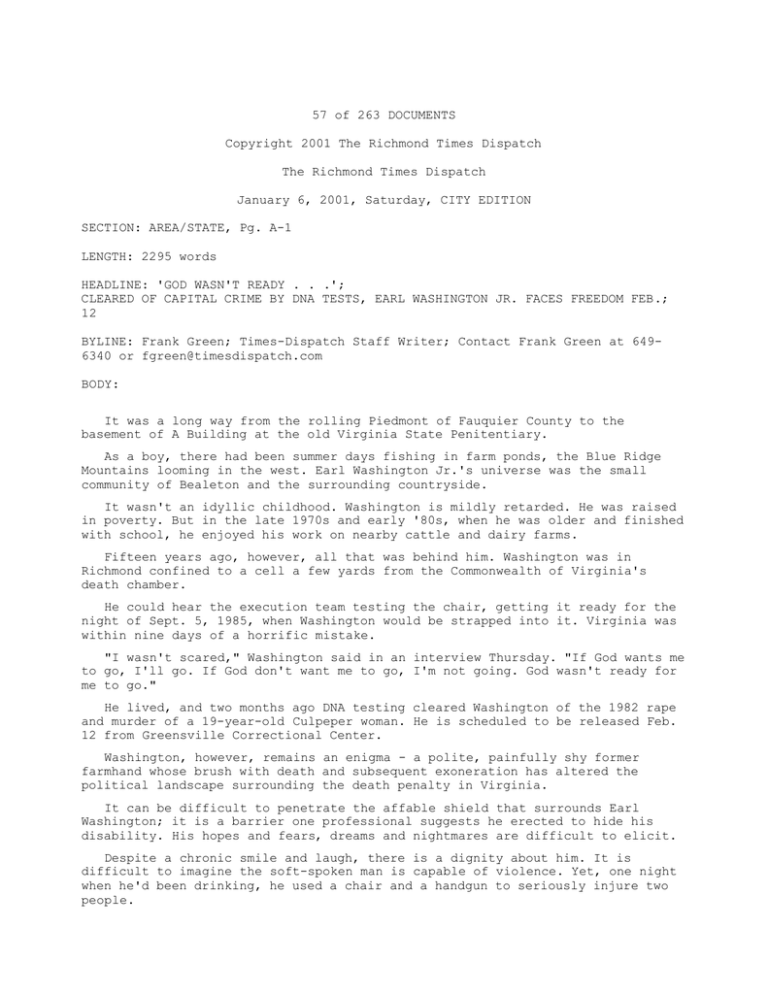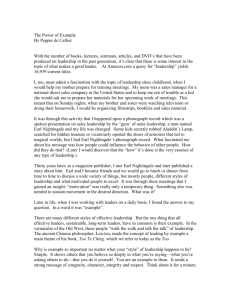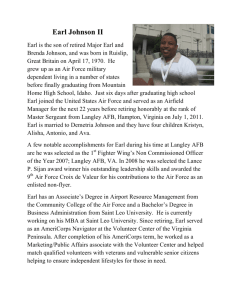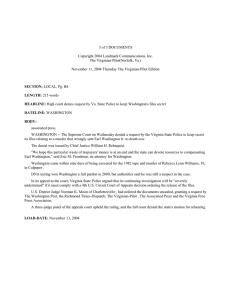57 of 263 DOCUMENTS Copyright 2001 The Richmond Times Dispatch
advertisement

57 of 263 DOCUMENTS Copyright 2001 The Richmond Times Dispatch The Richmond Times Dispatch January 6, 2001, Saturday, CITY EDITION SECTION: AREA/STATE, Pg. A-1 LENGTH: 2295 words HEADLINE: 'GOD WASN'T READY . . .'; CLEARED OF CAPITAL CRIME BY DNA TESTS, EARL WASHINGTON JR. FACES FREEDOM FEB.; 12 BYLINE: Frank Green; Times-Dispatch Staff Writer; Contact Frank Green at 6496340 or fgreen@timesdispatch.com BODY: It was a long way from the rolling Piedmont of Fauquier County to the basement of A Building at the old Virginia State Penitentiary. As a boy, there had been summer days fishing in farm ponds, the Blue Ridge Mountains looming in the west. Earl Washington Jr.'s universe was the small community of Bealeton and the surrounding countryside. It wasn't an idyllic childhood. Washington is mildly retarded. He was raised in poverty. But in the late 1970s and early '80s, when he was older and finished with school, he enjoyed his work on nearby cattle and dairy farms. Fifteen years ago, however, all that was behind him. Washington was in Richmond confined to a cell a few yards from the Commonwealth of Virginia's death chamber. He could hear the execution team testing the chair, getting it ready for the night of Sept. 5, 1985, when Washington would be strapped into it. Virginia was within nine days of a horrific mistake. "I wasn't scared," Washington said in an interview Thursday. "If God wants me to go, I'll go. If God don't want me to go, I'm not going. God wasn't ready for me to go." He lived, and two months ago DNA testing cleared Washington of the 1982 rape and murder of a 19-year-old Culpeper woman. He is scheduled to be released Feb. 12 from Greensville Correctional Center. Washington, however, remains an enigma - a polite, painfully shy former farmhand whose brush with death and subsequent exoneration has altered the political landscape surrounding the death penalty in Virginia. It can be difficult to penetrate the affable shield that surrounds Earl Washington; it is a barrier one professional suggests he erected to hide his disability. His hopes and fears, dreams and nightmares are difficult to elicit. Despite a chronic smile and laugh, there is a dignity about him. It is difficult to imagine the soft-spoken man is capable of violence. Yet, one night when he'd been drinking, he used a chair and a handgun to seriously injure two people. Questions to Washington often result in a grin and one-syllable answers. His usual response to a personal question is, "Whoa," followed by a chuckle. His longtime lawyer and now friend, Barry Weinstein, said, "It's hard to really get to know Earl and what Earl's all about. "I speak to Earl once a week and I've been speaking to Earl for years now, and unless I actively engage him in a conversation. . . . it's just 'Yes, sir' and 'No, sir,' because that's the way he's been brought up." But Washington, 40, has loosened up over the past few months. He, loved ones who grew up with him and professionals who have evaluated him offer a glimpse into what makes Earl Washington tick. Asked to describe himself, Washington said, "I'm just a nice person. I like to be happy." His passion as a tall, but skinny, child? "Cows," said James Grayson of Bealeton, a second cousin. "He always loved farming. He loved being around animals." Grayson, 15 years older than Washington, has known him all his life. * * * Washington, the 7-pound second of five children of Earl and Marie Washington, was born in a doctor's office in nearby Remington. Washington's and Grayson's families moved around the Bealeton area and remained close. Then as now, Washington "was laughing all the time," said Grayson. "Every time you would start talking to him, he would laugh; most of the time before he even answered you, he would laugh or grin. He was like that ever since he was small." Grayson, a disabled mason, said that even as a child Washington worked on three or four different farms. When the farm work got slow, Washington would help Grayson lay bricks. As a youngster he might get in a little mischief. "He might steal candy from somebody, but nothing serious. He was always easy to get along with. He would do anything in the world for anybody," said Grayson. Once the young Washington became excited and happy because a girl told him he looked like a chick. "I called him Chicky after that. I explained to him that chicks was for girls - he was a boy," Grayson said. * * * All was not laughter, however, in the Washington household. According to a social history written for Washington's attorneys in 1993, "the Washington children grew up in abject poverty." "In 1975 the family's weekly income was $ 75. Earl's elementary school teacher. . . . remembers that Earl's clothes were always too big or in need of repair," said the report. In addition, both parents, who died in 1995, drank heavily and fought often. The children were frequently subjected 16, he was hit with a shotgun blast fired his chest and abdomen and puncture wounds when he did not respond quickly enough to the report said. to corporal punishment. When Earl was by a relative and suffered wounds in of the liver and kidney. He was shot a command to bring in some firewood, Washington, interviewed in prison, defended his family, particularly his mother and father. They argued, he said, but "I loved my parents very much. Still do." School records, said the report, showed the Washington children were frequently absent, missing as much as 80 out of 180 school days in a year. Washington left school in the 10th grade at the age of 15 and started doing farm work. "I don't know why. I just didn't like school," he said. He worked on several farms in the area, one owned by Earl R. Frazier. Frazier died five years ago, but his widow, Carol, said she remembered her late husband saying he did not believe Washington could have committed rape and murder. Don Huffman, a beef cattle farmer at the time, employed Washington for several years up until the time he was arrested and also does not believe him capable of such crimes. "For his mentality, he was a good employee," said Huffman. "I always had to go pick him up because he didn't drive or anything." Washington drove tractors, handled hay and did other jobs. * * * Washington's nightmare began one night when he was 22 years old and still working for Huffman. Washington was drunk and broke into an elderly neighbor's home, hit her with a chair and stole a handgun. He then shot his brother in the foot with the gun. "They had been drinking," said his older sister, Alfreda Pendleton of Manassas. Washington was angry with her brother-in-law, who had picked a fight with him. He stole the gun and then wound up shooting his brother when his brother struggled with him, trying to take it away, Pendleton said. The gun went off, Washington said, when his brother pushed him against an icebox. Pendleton recalled the night Washington was arrested. "I was upset. Scared. The cops rushed in the house like one, two o'clock in the morning. They rushed in; we asked them, well, what do they want. They said they was looking for Earl Washington. "We asked, 'For what?' They said, 'A break-in and other crimes.' " Washington was questioned by police the morning of May 21, 1983, and confessed to the break-in and assaulting his neighbor. Eventually he would receive two 15-year sentences for the crimes. He also "confessed" that morning to an attempted rape, another break-in and a rape. Those charges would later be dropped when his confession proved inconsistent with the facts or the victims had identified someone else as the attacker. Finally, an officer asked him, "Earl, did you kill that girl in Culpeper?" According to police notes, "Earl sat there silent for about five seconds and then shook his head yes and started crying." He would go on to supply incorrect details about the crime, but also correct ones when asked leading questions, his lawyers say. * * * The crime was savage. In June 1982, Rebecca Lynn Williams, 19, was raped and murdered in her Culpeper apartment. She was stabbed 30 times but lived long enough to report she had been assaulted by one black man. Washington said he is not sure why he agreed with the police that he had committed the crimes. "If they had let me sober up before they started asking me questions, it would have been different," he said. Washington was convicted in large part on the strength of his own confession, and on March 20, 1984, he was sentenced to death. His sister said there was no way he could have committed the Culpeper crimes. "He was at the house the day that it happened," she said. "Earl couldn't find his way to Culpeper" and back. His second cousin said, "Everybody was shocked. Earl was the type of person they kept drilling something in his head, he would admit to anything." Ruth Luckasson, a professor of special education at the University of New Mexico, who evaluated Earl Washington in 1993, agreed. She said Washington innately believed that what others say is correct and his basic method of learning was to repeat what he had been told. "The combination makes for a person who, as many members of the community have stated, is extremely suggestible," she wrote. "As one former employer reported, 'You could get Earl to confess he walked on the moon.' " Luckasson wrote that she reviewed the police notes of Washington's interrogations during which he confessed to the various crimes. "In many ways, these confessions are archetypes of what can happen to people with mental retardation during intense questioning. Earl acquiesced to whatever the more intelligent person wanted . . . was obviously attempting to please authority figures," she concluded. "There [were] a lot of unanswered questions there that should have been answered at the time," said Huffman, his former boss. For instance, "How did he get there [to Culpeper]? How did he get back? Who took him back? He just wasn't capable of it." Pendleton said that when her brother was sentenced to die, "it was one of the worst experiences I ever went through in my life. I remember the verdict coming down and the next thing, me running out of the courthouse," she said. * * * In 1985, Washington, who did not have a lawyer, was moved from death row, then at the Mecklenburg Correctional Center, and placed in a cell near the electric chair, which was then at the Virginia State Penitentiary in Richmond. The penitentiary has since been razed. He knew the chair was nearby. "You couldn't see it. But you could hear it humming. I asked the CO [correctional officer] what was that noise, and he told me." Fellow death-row inmate Joseph Giarratano, whose death sentence would later be commuted, brought it to the attention of the federal courts that Washington was about to be executed and did not have a lawyer to represent him. Marie Deans, head of the now defunct Virginia Coalition on Jails and Prisons, was able to find a New York lawyer, Eric M. Freedman, to represent Washington, and the execution was called off. His case then meandered through the appeals process until 1993, during the administration of Gov. L. Douglas Wilder. A DNA test, which was unavailable at the time of the attack, was performed on evidence taken from the crime scene. The 1993 DNA tests strongly suggested Washington was innocent. But authorities said there was still a chance Washington could have committed the rape and murder. * * * A DNA test was also performed on spermatozoa found on a blue blanket at the crime scene. It was already known through blood tests that Washington could not have left those stains. But the DNA test results, which showed the donor of the sperm on the blanket was not Washington, was never made known to Washington or his lawyers. A PBS "Frontline" story on the Washington case revealed the DNA results. Last February, Washington's lawyers asked Gov. Jim Gilmore for new DNA tests. DNA testing technology had improved over the years to the point where it was possible Washington could be conclusively proven innocent or guilty. Gilmore delayed a decision on the testing until June. In October, Gilmore announced the tests did not find any of Washington's DNA at the crime scene and issued him an absolute pardon. The sperm on the blue blanket, it turned out, belonged to a convicted rapist. Gilmore ordered that investigation to continue. Washington was not freed, however. He must complete his sentence for assaulting his elderly neighbor and will be released on Feb. 12. In the wake of Washington's pardon, the Virginia Supreme Court has proposed modifying Virginia's rule against allowing new evidence in capital cases to be used in court if it is discovered more than 21 days after final judgment. A bipartisan effort will also be made in the coming General Assembly to loosen the 21-day rule, the toughest in the country. * * * Ask Washington what that means to him and he says, "Whoah. I feel good about it. I just don't let it go to my head." Washington said he's learned two lessons in the 18 years he has been imprisoned, including 9 1/2 years on death row: to tell the truth and to stay away from alcohol. "I don't care if I never see another drink," he said. No one from the government has apologized to Washington. Yet remarkably, he is not bitter. He would like an apology from the Culpeper and Fauquier authorities who questioned him, but he said he knows that will never happen. One of his first priorities after he is released: "I want to eat something really nice. Fried chicken. I want a nice, home-cooked meal." He will be staying in a facility in Virginia Beach where he will receive support services. He is not sure he ever wants to return to farming. He does, however, think he'd like to start a family of his own. Washington also has some concerns about freedom. "I fear the street - not the people - the street" with its pitfalls and temptations. All things considered, though, he thinks he'll do fine "probably a lot better than some people think I will." GRAPHIC: PHOTO LOAD-DATE: January 9, 2001 102N9T ********** Print Completed ********** Time of Request: May 30, 2001 Print Number: Number of Lines: Number of Pages: 40:0:28350247 227 Send To: 05:07 pm EST MOORE, GARY HOFSTRA UNIVERSITY 122 HOFSTRA UNIVERSITY HEMPSTEAD, NEW YORK 11549-1220





